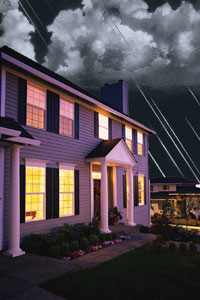Home Electrical Safety
 Download a printable brochure of home electrical safety tips. (PDF)
Download a printable brochure of home electrical safety tips. (PDF)
Power Lines
Treat every power line as if it were a "live" wire and dangerous. Report any broken poles or trees on the power line or any downed electric lines to NOVEC or the police immediately. Take necessary precautions to keep others away from the area until qualified personnel arrive on the scene. If a power line falls on a vehicle, stay away and avoid making contact. Report the incident to NOVEC or the police immediately. If someone is inside the car, have the person stay there until professional help arrives.
Hot Water
Most adults will suffer a third degree burn if exposed to 150 degree water for only two seconds. Third degree burns will occur in six seconds at 140 degrees and in 30 seconds at 130 degrees. Approximately five minutes are required to cause a third degree burn at 120 degrees. According to the National Institute for Burn Medicine, more than half of all burn accidents involving infants and children can be prevented by lower water heater settings.
NOVEC recommends water heater thermostats be set between 110 to 120 degrees to prevent accidental scalding. Many water heaters are factory set at 140 degrees or greater. Be sure to disconnect the water heater before making this adjustment by removing the appropriate fuse or by tripping the correct circuit breaker.
Electricity Safety at Home
- Check electric cords often for damage. Have damaged cords repaired right away. Worn cords can cause shock, short circuit or fire.
- Pull the plastic housing of the electric plug to take it out of the wall socket; never pull on the cord.
- Do not overload electric outlets with too many items plugged in at once.
- Water and electricity do not mix. Do not operate electric appliances such as radios or hair dryers near a bathtub or sink full of water.
- Never stick your fingers, toys or anything except electric plugs into electric outlets.
- Unplug any appliance that emits sparks or that does not work properly.
- Always unplug an appliance before cleaning or repairing it.
- Always unplug the toaster or other appliance when removing a piece of stuck food.
- Remember that a turned-off appliance is still connected to electricity until it is unplugged.
- Limit use of extension cords. Make sure the cord is the appropriate size for use. Some appliances or equipment require heavy-duty cords.
Electricity Safety Outdoors
- Never fly kites near overhead power lines. If your kite becomes caught in the lines, let it go. You could get a bad shock or be electrocuted.
- Go inside during thunderstorms. It is very dangerous to stay outside when there is lightning. If you get caught outside, squat low to the ground allowing only your shoes, which act like insulators, to touch the ground.
- Always wear closed-toe shoes when operating an electric lawnmower or hedge clippers.
- Never use electric appliances outside in the rain or on wet surfaces.
- Stay away from electrical equipment, such as substations, transformer boxes and electric poles.
- Be aware of the location of power lines when using an extension ladder and long-handled tools such as swimming pool nets and tree-trimmers.
Other Electrical Safety Tips
- Stay Safe Around Electricity - Look Up! Look Down! Look Out!
- Safety Tips During Outages
- When Electrical Injury Occurs - Symptoms & First Aid
- Storm Safety - When Lightning Strikes
- Severe Storm Safety
For more information
For more information about home safety tips, contact NOVEC's Business Development & Energy Services division locally at 703-392-1503, or e-mail [email protected].

